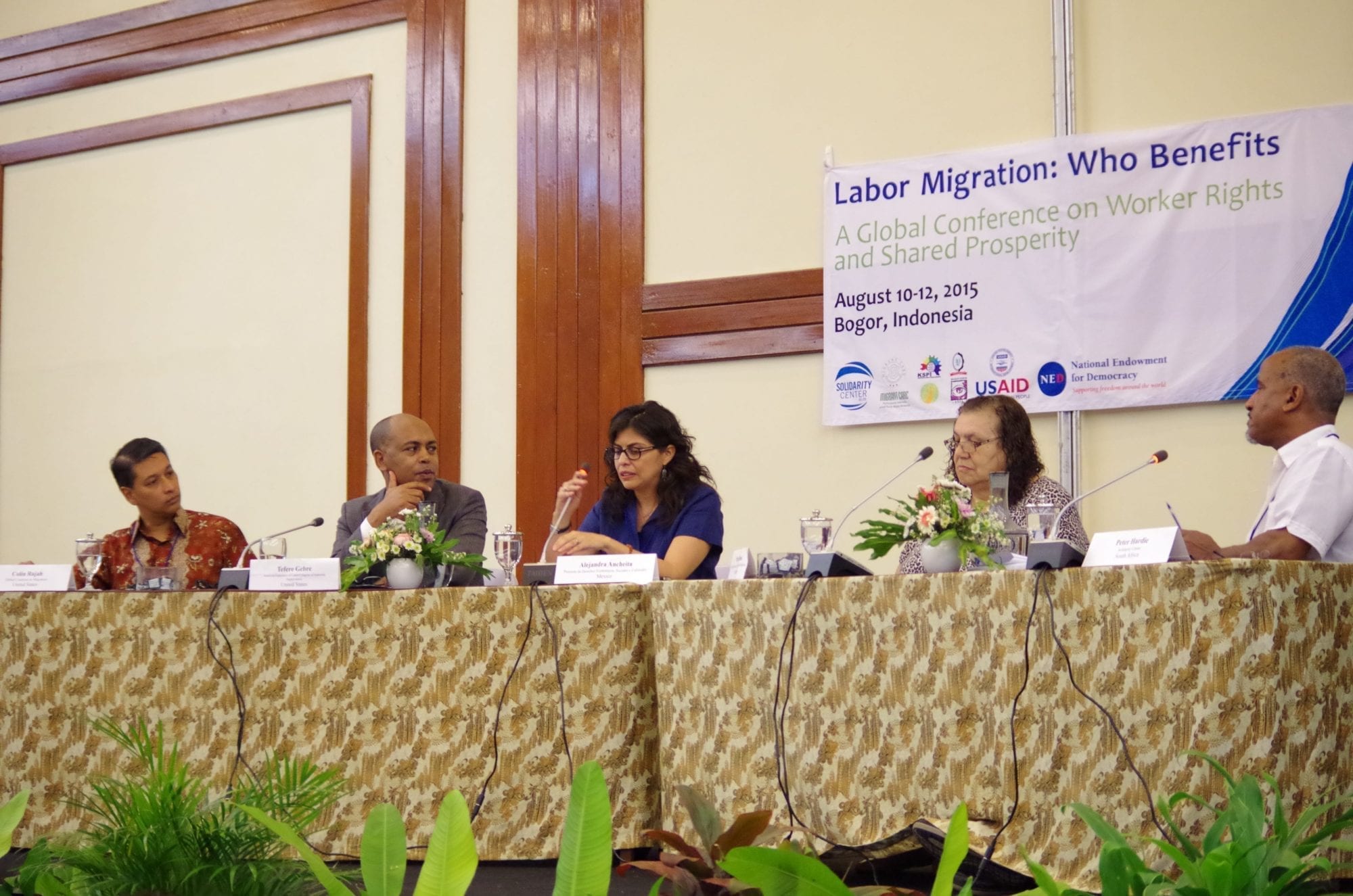
Aug 12, 2015
“Organizing campaigns that are led by migrant workers themselves are making the impossible possible,” says Tefere Gebre, AFL-CIO executive vice president, succinctly summing up the discussion that opened the second day of the conference Labor Migration: Who Benefits?
“When workers come together, it doesn’t matter if you are a native or a migrant. If we don’t protect work for migrant workers, all workers are threatened.”
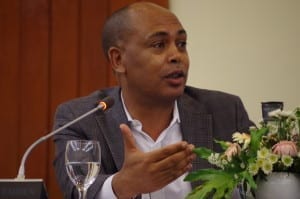
“If we don’t protect work for migrant workers, all workers are threatened.”–AFL-CIO Executive Vice President Tefere Gebre Credit: Solidarity Center/Kate Conradt
Gebre joined panelists at the session on Migrant Worker Voice, Activism and Organizing, part of the August 10–12 Solidarity Center conference on labor migration in Indonesia.
He discussed how U.S. unions are partnering with migrant worker rights groups to win collective bargaining agreements and further empower workers, a strategy that Alejandra Ancheita, executive director of ProDESC (Project for Economic, Cultural, and Social Rights), a Solidarity Center ally, says is key to success in Mexico where she works.
Ancheita, winner of the prestigious international Martin Ennals Award for Human Rights Defenders, discussed how U.S. and Mexican labor rights organizations are working in a cross-border justice alliance to support seasonal workers in the northern state of Sinaloa.
“That has given birth to an organization of seasonal workers that includes a profound analysis of the legal framework in both the United States and Mexico that they can use in defense of their legal rights.”
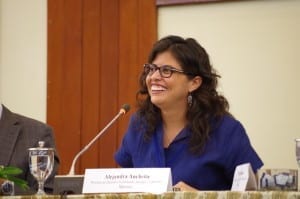
Alejandra Ancheita is director of the Mexico-based ProDesc, which organizes workers before they migrate so they know their rights. Credit: Solidarity Center/Kate Conradt
Key to migrant worker empowerment, Ancheita says, is organizing workers and educating them about their rights before they leave the country.
“When migrant are organized in their countries of origin, they are empowered to stand up for their rights in the destination countries,” she says. “This organizing among workers in their origin countries also helps workers have a more global perspective and more of a strategy for defending their rights.”
Myrtle Witbooi, president of the International Domestic Workers Federation (IDWF) and a former domestic worker, made the connection between organizing domestic workers and migrant workers, with both groups “undervalued, underpaid and exploited.”
“In the international domestic workers network, we have a policy to educate our domestic workers to understand they have legal rights in whatever country they are going to. As we grow, we can ensure that migrant workers are recognized. Our role is to spread this message to the world.”
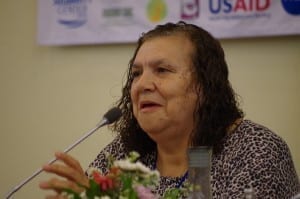
“We can ensure that migrant workers are recognized. Our role is to spread this message to the world.”–IDWF President Myrtle Witbooi. Solidarity Center/Kate Conradt
Witbooi, who last week was named a winner of the Global Fairness Initiative’s Annual Fairness Award, in 2013 accepted the AFL-CIO’s George Meany-Lane Kirkland Human Rights Award on behalf of the IDWF.
Rounding out the panel, Colin Rajah, coordinator and co-founder, Global Coalition on Migration, focused on the role of labor recruiters in the migration process.
The coalition, an open network of 90 members in 40 countries, brings together unions and human rights groups that agree the recruitment industry “is in dire need of fundamental changes,” says Rajah.
“As migrant workers, we need to take control of the process and do that in unity.”
Rajah says recruitment reform currently is not a high priority for the Global Forum on Migration Development (GFMD) this year, but he anticipates it will be in the next year or two and the coalition is working to ensure it is. The GFMD is a non-binding and government-led process open to United Nations member states and observers “to advance understanding and cooperation on the mutually reinforcing relationship between migration and development and to foster practical and action-oriented outcomes.”
More than 200 participants are taking part in Labor Migration: Who Benefits? A Solidarity Center Conference on Worker Rights & Shared Prosperity.
Follow the conference on the website and on Twitter @SolidarityCntr.
Aug 11, 2015
United Nations Special Rapporteur on Freedom of Association, Maina Kiai, gave a video greeting to the more than 240 participants at the Solidarity Center Labor Migration Conference in Indonesia in August.
“International law is very clear that you have your rights wherever you are–that you don’t lose your rights when you leave your country,” Kiai said.
Listen to his full message.
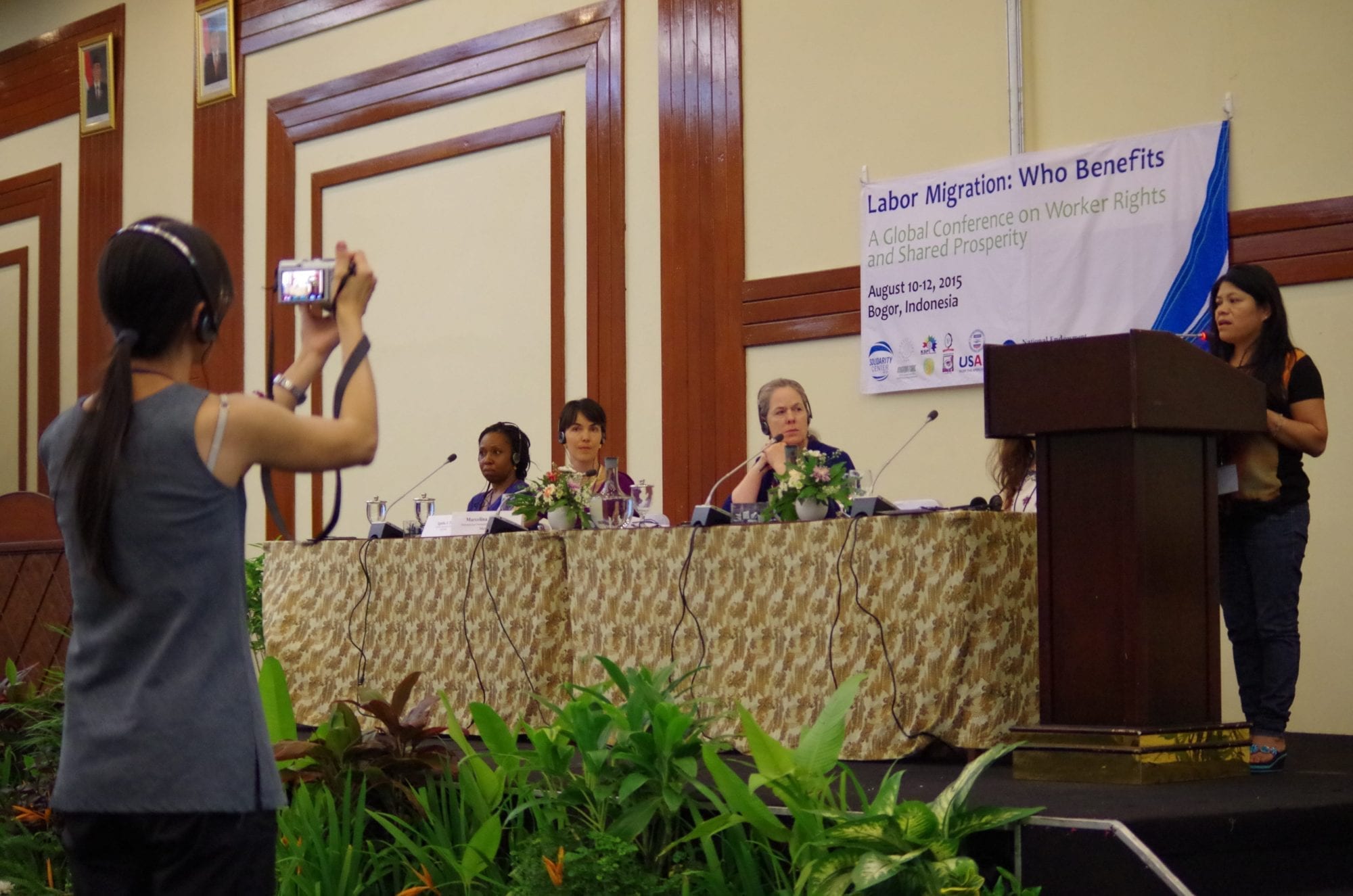
Aug 11, 2015
Participants in Monday’s final session of the Solidarity Center labor migration conference engaged in a lively discussion with panelists in a discussion of migrant workers’ vulnerability to gender-based violence.
Lisa McGowan, senior specialist for gender equality, outlined the broad picture, pointing out that gender-based violence is “one of the most widespread human rights violations in the world,” and migrant workers are especially at risk of gender-based violence because they are often invisible.
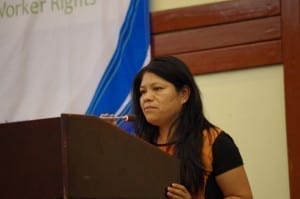
“Domestic workers suffer violence for being women, migrants and indigenous people.”–Marcellina Bautista, leader of the Center of Support and Training for Domestic Workers.
Credit: Solidarity Center/Kate Conradt
Describing her work organizing and supporting domestic workers, many of whom are migrants, Marcellina Bautista, the leader of the Center of Support and Training for Domestic Workers (CACEH), said that “domestic workers suffer violence for being women, migrants and indigenous people.”
Bautista, who worked as a domestic worker for many years, says domestic workers encounter “all kinds of violence in the homes where we work.”
“The majority of the 2.3 million people in Mexico who do domestic work are women and girls” who are highly vulnerable to gender-based violence, says Bautista, who also serves as International Domestic Workers Federation (IDWF) regional coordinator for Latin America.
The CACEH works with domestic workers who face workplace violence, helping migrant workers understand that they have the same rights as other workers in Mexico.
Farm work is another sector where women workers are especially vulnerable to gender-based violence, and Agatha Schmaedick Tan discussed the Coalition of Immokalee Workers’ (CIW) efforts to end sexual harassment and violence among tomato pickers in Florida. Tan cited a study that found some 80 percent of female farmworkers had experienced sexual harassment at work in 2010.
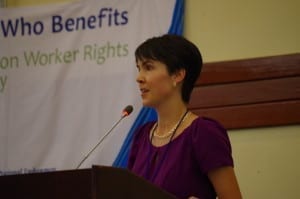
“Sexual harassment on the job persists worldwide,” Agatha Tan, counsel for the Coalition of Immokalee Workers. Credit: Solidarity Center/Kate Conradt
Describing Immokalee, Florida, as “not a town, but a labor reserve,” Tan outlined CIW’s path breaking Fair Food Program, which CIW negotiated with growers and which 14 major corporations have signed. Under the code, which covers as many as 100,000 workers in a year, farms must comply with fundamental labor standards, including preventing violence and sexual harassment at work. Corporations agree to buy only from farms that comply, and auditors annually evaluate the farms. Some 90 percent of Florida tomato growers have signed on to the program.
“Sexual harassment and violence on the job is illegal in most countries, yet sexual harassment on the job persists worldwide due in part to the difficulties of enforcement,” she said.
Closing the panel, Chidi King, International Trade Union Confederation Equality Department director, told participants: “We as a labor movement have not done enough to bring (gender-based violence at work) to the fore of our agendas. We still see this as a personal issue,” not one to be dealt with at the organizational level.
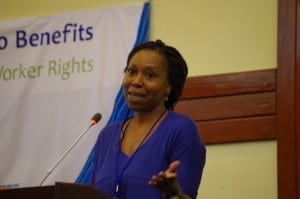
Chidi King, ITUC Equality Department director, rallied participants to push for an ILO standard on gender-based violence at work. Credit: Solidarity Center/Kate Conradt
King noted that the ILO has not taken up gender-based violence because of resistance of “very regressive governments,” and urged participants to push the ILO to create a standard covering gender-based violence.
“When you’re talking about your organization’s activities, have this front and center. It cannot be an issue we continue to remain silent about.”
More than 200 participants are taking part in the Aug. 10-12 event, Labor Migration: Who Benefits? A Solidarity Center Conference on Worker Rights & Shared Prosperity.
Follow the conference on the website and on Twitter @SolidarityCntr.
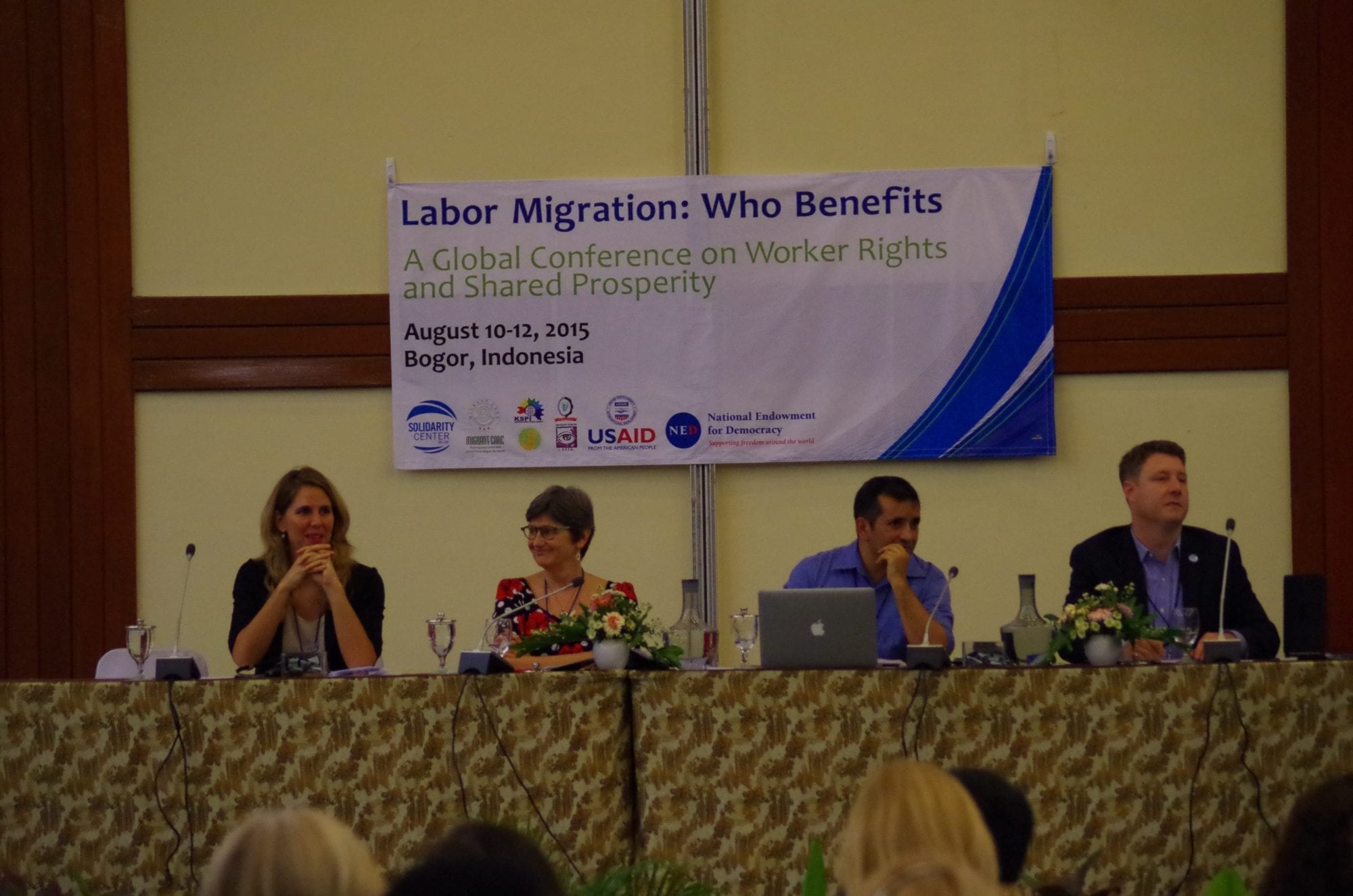
Aug 10, 2015
Asia’s growth as a global factory comes at a price, says Sanjiv Pandita, executive director of the Asia Monitor Resource Center (AMRC) in Hong Kong, Special Adminstrative Region of China.
“The most important point is that migrant workers pay the price,” he said. In fact, Asia has more than 70 percent of global vulnerable workers—nearly 1 billion.
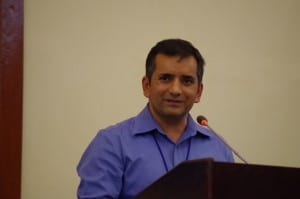
Migrant workers pay the price for globalization.–Rajiv Pandita, executive director of the Asia Monitor Resource Center (AMRC). Credit: Solidarity Center/Kate Conradt
Pandita, whose organization promotes democratic labor in Asia, spoke on the panel, Precarious Work and Labor Migration, the first portion of the Monday afternoon plenary Labor Migration: Who Benefits? A Solidarity Center Conference on Worker Rights & Shared Prosperity.
“The story takes place in the intricate network of supply chains,” Pandita says. Global supply chains account for 80 percent of global trade, and Asia accounts for 50 percent of that portion.
“The systematic marginalization of migrant workers is a crisis for democracy.”
Panel moderator John Hosinski, Solidarity Center senior program officer for Africa, defined precarious work as characterized by low wages, unstable employment and is legally ill-defined, which leads to the exclusion of workers from laws that enable them to form unions and gain power to achieve decent work.
Describing the years of apartheid South Africa, Jane Barrett, affiliate support coordinator, Congress of South African Trade Unions (COSATU), pointed out that apartheid was based on large-scale, cheap labor, control of internal migration and short-term contracts with no economic or social rights for all black workers.
“Apartheid is similar to cross-border migration today.”
Barrett described the efforts of COSATU and its affiliates to organize and support migrant workers, including the Food and Allied Workers Union’s focus on organizing migrants in cross border trade and the National Union of Mineworkers’s campaign for permanent residency of migrant workers.
A fundamental part of empowering migrant workers, Barrett says, is first educating union members in a federation-wide awareness campaign, one that involves challenging assumptions and providing a new way of seeing migrant workers.
Closing the session, Alison Friedman, vice president of the Global Fund to End Slavery, challenged participants to successfully convey the economic argument for migrant worker rights as well as the moral argument. Friedman said companies that are leaders in providing decent work for migrant workers say they do so because it helps their bottom line—workers who earn a living wage in safe and healthy workplaces are much better workers.
Aug 10, 2015
Another union leader in Honduras, where violence is commonplace, has received a death threat. José Armando Flores Jimenez, president of the Union of Health Workers in eastern Honduras-SITRASAOH, was threatened for allegedly making public the discovery of medications buried on the grounds of Health Region Number Seven buildings in El Paraiso, possibly to divert them from public use.
Flores, a member of the Network Against Anti-Union Violence in Honduras, is the second member of that network to be targeted for violence.
The first, Héctor Martínez Motiño of the university workers’ union SITRAUNAH, was shot and killed by gunmen in June as he drove home from work after three other attempts on his life and numerous anonymous threats, linked to his reporting of violations of human and worker rights within the university.
The Network Against Anti-Union Violence in Honduras is comprised of labor union activists and the human rights non-governmental organization ACI-Participa, and is supported by the Solidarity Center.
Honduran trade unionists are routinely threatened, intimidated, harassed and even murdered, and criminals are rarely brought to justice. A damning report documenting widespread and serious violations of labor rights in Honduras was issued by the U.S. Department of Labor in March this year and was prompted by a complaint filed in 2012 by the AFL-CIO and 26 Honduran unions and NGOs under the Labor Chapter of the Central America Free Trade Agreement (CAFTA).
Learn more here.










